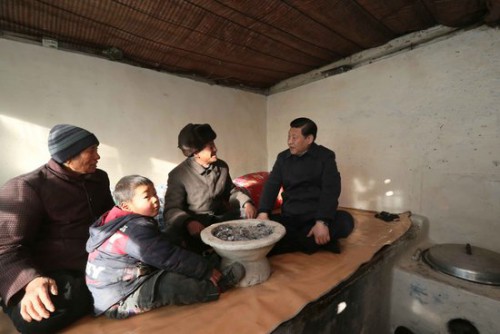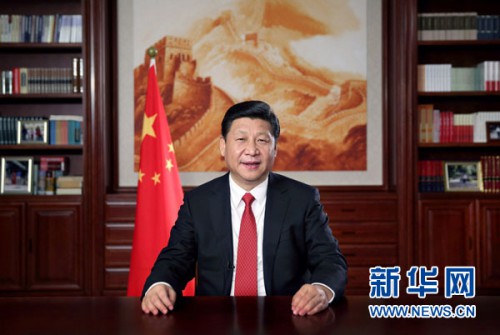The following is our translation of the Xi Jinping profile from the Shanghai Observer:
The topic of Xi Jinping and time has come up often in [articles by] the Study Group (小组).
Early this year, Xi Jinping issued the classic sigh, “Where has the time gone?” The answer he gave to his own question was that it had all been spent on work. On an overseas trip, Xi Jinping once said he often felt conflicted about overseas travel, because there were so many things that needed doing back home. There was once a case, according to the Study Group, where [Xi Jinping] issued written comments first thing in the morning on a [policy] document received at midnight the night before.
The article we share today comes from the Shanghai Observer (上海观察), and it was written by Guan Jintai (官锦台). As a writer who has observed Xi Jinping at close quarters, Guan has discovered that Xi Jinping’s daily work “proceeds at high speed and with great energy” (高速运转且极费精力). The ordinary day in the life of Xi Jinping recorded by the writer certainly seems to be extremely busy.
I’m sure many people would like to know how work is arranged for Xi Jinping every day. On Friday, October 24, many Chinese people were savoring the communique emerging from the Fourth Plenum [of the 18th Central Committee of the CCP], Xi Jinping was already beginning a new busy day.
As someone who specializes in international news, I had the good fortune of observing Xi Jinping at close range as he handled the days foreign affairs. From this I gained an understanding of the daily work life of this, China’s most senior leader. I discovered that Xi Jinping that what Xi Jinping must accomplish each day is a series of tasks “proceeding at high speed and with great energy.” It’s not the least bit an exaggeration to say that he is “at work both day and night” (夙夜在公). Of course, like the average Chinese person, Xi Jinping’s busy day is not without humor and joy.
There was no way for me to know exactly what time Xi Jinping got up from bed that morning, but I could be sure that he, like all those working at the crack of dawn, he had eaten his breakfast before first light, and after he had read his “Daily Briefing” (每日简报) had proceeded to the Great Hall of the People. There he had to meet with international representatives present for the memorandum signing for the launch of the Asian Infrastructure Investment Bank.
According to my observations, regardless of the particular task at hand, Xi Jinping is always able to proceed according to the larger background of domestic and international affairs. He speaks in a bold and down-to-earth manner. For example, at this memorandum signing he said, “If you want to prosper, you must first build a road” (要想富,先修路). And he said, “Those who unite in purpose can move mountains” (人心齐,泰山移). Everyone present nodded in praise.
His domestic and international views were expressed in the following way:“China is right now in the midst of a thorough deepening of reforms, and it is pushing ever closer to its goals of the ‘Two Centennials’ (两个一百年) [of the CCP in 2021, and of the “New China” in 2049]. China’s economy will continue to grow in a healthy manner, and China’s development cannot do without Asia or without the world. We will firmly and steadfastly pursue a win-win strategy of opening up. I have talked about building a Silk Road economic belt, a 21st-century Silk Road of the seas, and the Asian Infrastructure Investment Bank with the goal of deepening economic cooperation among the nations of Asia — in order to achieve common development. We will do our utmost to ensure that China’s own development benefits the nations of Asia and the world.”
That day, Xi Jinping also conducted “foreign affairs by telephone.” On the other end of the line was Indonesian President Joko Widodo. Xi Jinping congratulated Widodo on his becoming the new Indonesian president, and he invited him to attend the informal meeting of leaders at the Asia-Pacific Economic Cooperation (APEC) in Beijing next month.
Xi Jinping’s work rhythm is “fast,” to use the words of CCP Central Committee Politburo member and General Office director Li Zhanshu (栗战书). Li Zhanshu recently wrote in an article in Secretary Work (秘书工作), [a magazine published by the Research Office of Secretariat of the CCP Central Committee], that “General Secretary Xi Jinping demands that we ‘work so there is no backlog, and nothing left overnight’ (案无积卷、事不过夜). The general secretary works like this himself. His work style is very rigorous, and his rhythm is very fast. [Policy] documents requiring instructions from the general secretary always come back with written instructions by morning the next day, regardless of how late they get to him, even if its at midnight.”
This sort of work attitude and style was expressed most incisively in the afternoon as Xi Jinping met with visiting Tanzanian President Jakaya Mrisho Kikwete. When the welcome ceremony outside the East Gate of the Great Hall of the People was concluded, Xi Jinping proceeded with rapid steps to the conference room, so that those of us behind had to jog along to keep up. As soon as the Tanzanian delegates were seated, Xi Jinping said there were many things they needed to talk about today, and to save time they should use simultaneous interpretation.
The facts show that simultaneous interpretation substantially increases the efficiency of meetings, and the meeting ended by 6:15 in the afternoon. Leaders from both countries then went straight to the signing ceremony for the cooperative agreement, held in the Hebei Hall (河北厅). Even though there was just a short walk between the two halls, I saw for myself how Xi Jinping and President Kikwete were engaged in intense conversation.
These two tense meetings in the morning and afternoon would be enough to exhaust anyone, so it was time for a much needed rebalancing. And this is how Xi Jinping accomplished it. When the heads of the two countries came to the table where they were to sign, Xi Jinping noticed that President Kikwete seemed to want to sit down, so he quipped cheerfully, we have to stand and serve as a backdrop for them. Hearing this, the translator instantly interpreted the remark as Kikwete listened attentively, and then the whole atmosphere of the scene relaxed a great deal.
I noted that during the signing ceremony one of Tanzania’s ministers forgot to shake hands with Xi Jinping after the copies were exchanged, and at the express urging of Kikwete, there was a quick “makeup shake” (“补握”). At that moment, Xi Jinping, perhaps thinking himself that this touch was rather interesting, started to laugh.
Whatever you do, don’t imagine that Xi Jinping’s day was then over. Because after that he still needed to host a banquet for President Kikwete. The lights were brilliant on the third floor of the Great Hall of the People, and at this time the lights went on over Chang’an Avenue as well, a parade of lights. As most people were having family dinners or watching television, he was still busying himself with affairs of state.
I thought of the time last year when Xi Jinping was visiting Russia. When he was meeting with Chinese Embassy staff in Moscow and representatives of Chinese-invested businesses there, he said: “They say misery can be accompanied by happiness; but for me, I find joy in exhaustion.”
And based on my observations over that one day, Xi Jinping not only “finds joy in exhaustion” when he is on foreign tours, but at home too he “finds joy in exhaustion.”






















